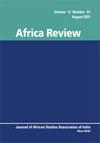Developmental inequality and living on the margins in post-colonial Zimbabwe: the case of Musana District
IF 0.5
Q4 AREA STUDIES
引用次数: 0
Abstract
ABSTRACT This paper explores the roots of rural poverty in Zimbabwe within the context of the role of the state and its economic and political interests over time and specific space. It traces the socio-economic and political factors that led to the impoverishment of rural areas in Zimbabwe, demonstrating that rural poverty is a colonial legacy whose roots lie in the racial ideology of the state. African Reserves were basically created as reservoirs of cheap labour for white-owned mines and farms and emerging urban areas. They were also created to separate Africans from whites in terms of service provision at every level. However, the article further examines the role of the post-colonial government in addressing these colonial imbalances that left urban centres as islands of developments in a sea of rural underdevelopment. Using Musana District as a case study, it interrogates post-colonial state policy towards rural development and its impact in addressing the vestigial inequalities that existed between rural and urban areas. The study makes the point that despite the consistent political support it receives from rural dwellers rural development and the government's claims that have been the cornerstone of its policies since independence, the Zimbabwean government has done little to sustainably and effectively provide basic amenities to rural areas since independence. Moreover, the paper argues that the ruling party has not only failed to contribute towards rural development but has been a direct beneficiary of the status quo as it has enabled it to maintain political stranglehold in rural areas.后殖民时代津巴布韦的发展不平等和边缘生活:Musana区的案例
本文在国家角色及其经济和政治利益随时间和特定空间变化的背景下,探讨了津巴布韦农村贫困的根源。它追溯了导致津巴布韦农村地区贫困的社会经济和政治因素,表明农村贫困是殖民遗留问题,其根源在于国家的种族意识形态。非洲储备基本上是作为白人拥有的矿山、农场和新兴城市地区的廉价劳动力储备而建立的。设立这些制度也是为了在提供各级服务方面将非洲人与白人区分开来。然而,本文进一步探讨了后殖民政府在解决这些殖民不平衡方面的作用,这些不平衡使城市中心成为农村欠发达海洋中的发展岛屿。本文以Musana地区为例,探讨了后殖民时期国家对农村发展的政策及其对解决城乡之间遗留不平等现象的影响。该研究指出,尽管从农村居民那里得到了持续的政治支持,而且政府声称自独立以来农村发展一直是其政策的基石,但自独立以来,津巴布韦政府在可持续和有效地为农村地区提供基本设施方面做得很少。此外,该论文认为,执政党不仅未能为农村发展做出贡献,而且还成为现状的直接受益者,因为它使其能够保持对农村地区的政治控制。
本文章由计算机程序翻译,如有差异,请以英文原文为准。
求助全文
约1分钟内获得全文
求助全文
来源期刊

Africa Review
AREA STUDIES-
CiteScore
1.80
自引率
12.50%
发文量
22
期刊介绍:
Africa Review is an interdisciplinary academic journal of the African Studies Association of India (ASA India) and focuses on theoretical, historical, literary and developmental enquiries related to African affairs. The central aim of the journal is to promote a scholarly understanding of developments and change in Africa, publishing both original scholarship on developments in individual countries as well as comparative analyses examining the wider region. The journal serves the full spectrum of social science disciplinary communities, including anthropology, archaeology, history, law, sociology, demography, development studies, economics, education, gender studies, industrial relations, literature, politics and urban studies.
 求助内容:
求助内容: 应助结果提醒方式:
应助结果提醒方式:


